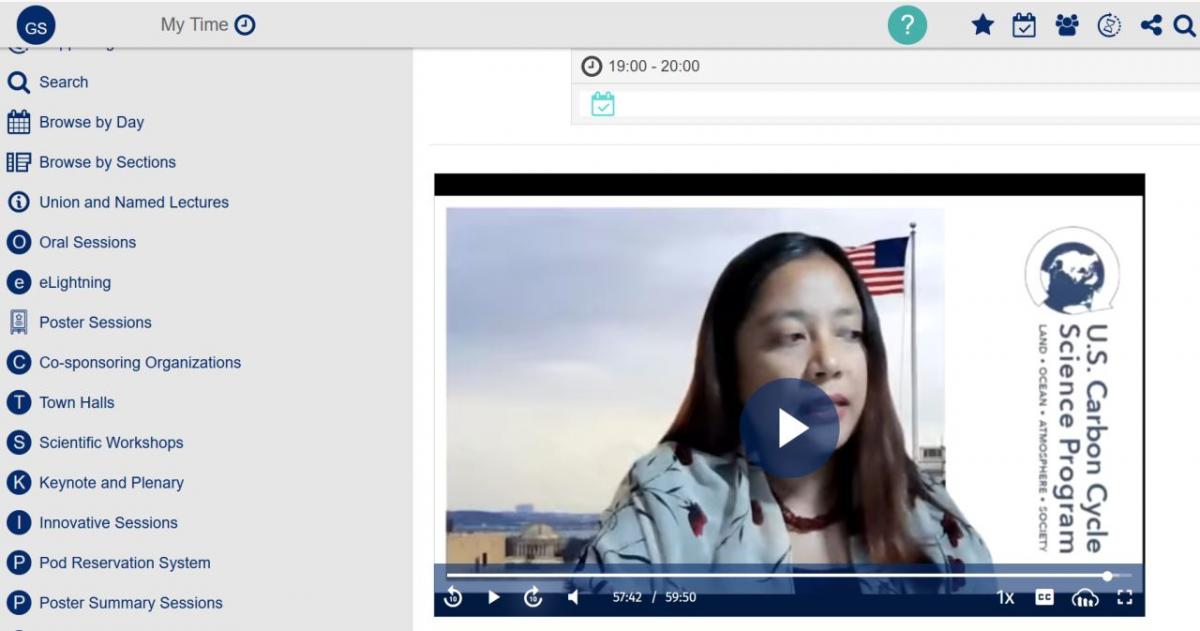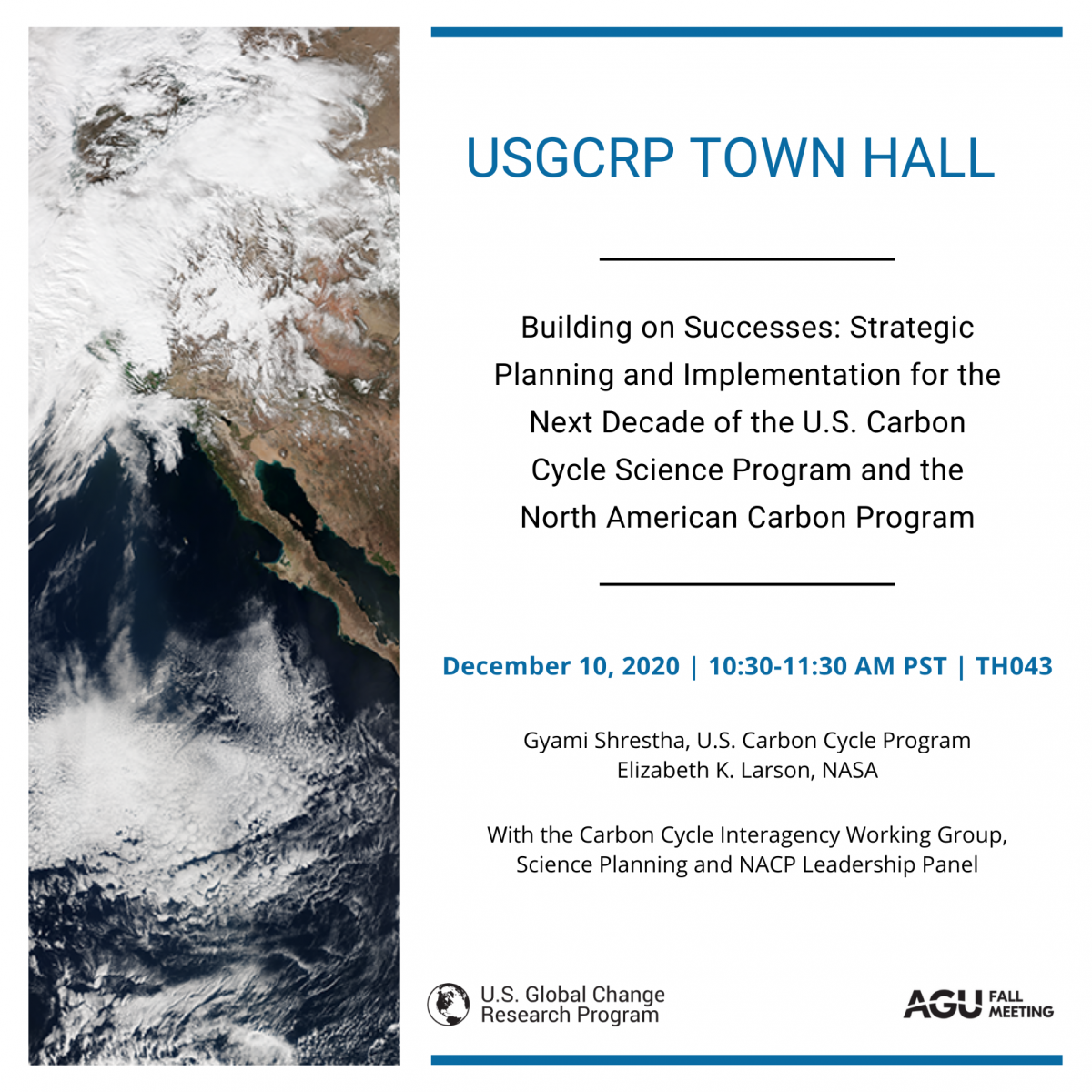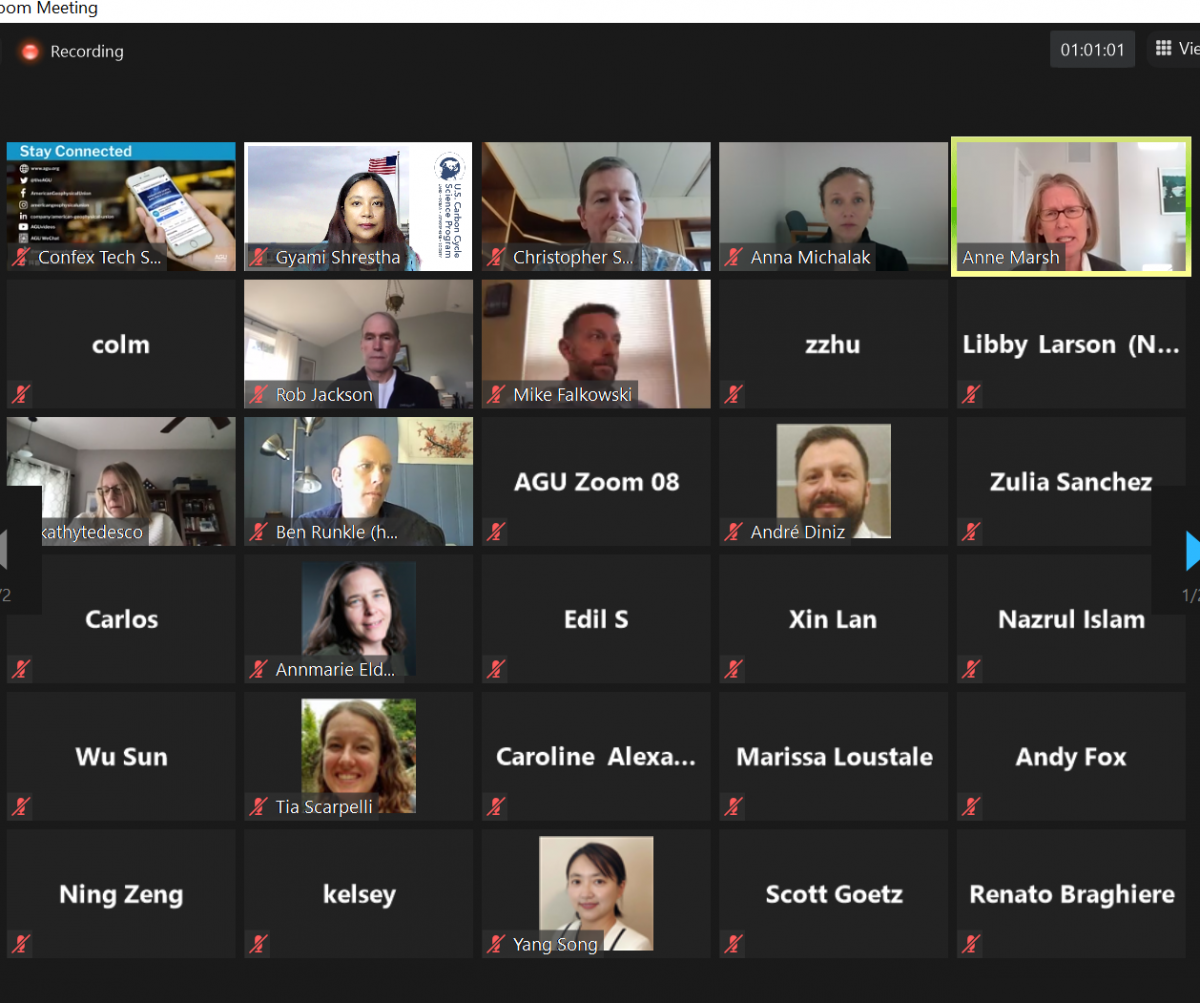- Home
- About
- Programs
- Carbon Science Planning
- Resources
- News & Opportunities
- Contact Us
Recordings of U.S. Carbon Cycle Science Program AGU sessions and town hall
January 4, 2021
Thanks to the hundreds of live participants who joined us during our sessions and town halls at the December 2020 American Geophysical Union Annual Meeting. A summary of these events and links to recordings are provided below.
It has been 50 years since the first Earth Day, 30 years since the Global Change Research Act and over 20 years since a U.S. Carbon Cycle Science Plan (1999) and the establishment of the U.S. Carbon Cycle Science Program by the Carbon Cycle Interagency Working Group. Decades of coordinated U.S. and global climate change experimental, observational, monitoring and modeling efforts have advanced the understanding of feedbacks between anthropogenic and natural carbon cycle components. This session showcases decadal breakthroughs in carbon cycle science since ‘A U.S. Carbon Cycle Science Plan (2011)’. These advances, some of which were highlighted in the Second State of the Carbon Cycle Report (SOCCR2), are deepening carbon cycle, climate change mitigation and negative emissions research knowledge, as facilitated and coordinated by federal, state and private sector collaborations. During the Dec 2020 American Geophysical Union Annual Meeting, we examined pertinent upcoming decadal research needs to further enhance understanding, applications and progress in carbon cycle science.

Link to Presentation Recordings
Videos of the presentations above from this session as well as an AGU talk on 'Converging for Climate Interventions: Negative Emissions Strategies for Positive Solutions' by the US Carbon Cycle Science Program Office Director, are now openly available via ourYoutube channel.
Presentations from Vimbikayi Rachel Chimuka, Sassan Saatchi, Libby Larson, John L. Field, Christopher L. Sabine, Arlyn Andrews, Galen McKinley and others addressed:
- A Decade of Discoveries for Blue Carbon Ecosystems
- IOC-R: A vision of Coordinated Ocean Carbon Research and Observations
- Quantifying the ocean carbon sink for 1994-2007
- Autonomous ocean CO2 flux observing
- Towards an international atmospheric carbon observing system
- Divergence in Quantifying Terrestrial Fluxes of Carbon in Global Carbon Budgets
- Quantifying the effect of carbon cycle feedback uncertainty in concentration and warming projections under RCP emissions scenarios
- Observing, resolving and predicting terrestrial carbon cycle and its sensitivity to climate
- Asymmetry in the climate-carbon cycle response to positive and negative CO2 emissions
- Understanding Carbon Dioxide Removal and Management within an Integrated Research Program for Evaluating Climate Intervention Strategies
- Sustainable intensification or natural climate solutions?
The recording of our American Geophysical Union Annual Meeting session 'A Decade of Progress in Global Carbon Cycle Science' is available via the AGU site for registered participants. Our Town hall recording is also available on the AGU site.
Oral Session Title: B011. A Decade of Progress in Global Carbon Cycle Science I Oral
Link to all uploaded long recorded talks on AGU site here.
Poster Session Title: B001. A Decade of Progress in Global Carbon Cycle Science II Posters
Town Hall: Building on Successes: Strategic Planning and Implementation for the Next Decade of the U.S. Carbon Cycle Science Program and North American Carbon Program
The U.S. Carbon Cycle Science Program (US CSSP), represents 14 federal agencies and departments with research and funding portfolios encompassing carbon and pertinent biogeochemical cycles across land, water, air and society. The Program incorporates broad coordinated community input such as from the U.S. Carbon Cycle Science Plans (1999, 2011). While the 1999 Plan laid out the framework for the Program, researchers and program managers have been using the 2011 Plan to expand and enhance our understanding of the carbon cycle from local to regional to global scales in the last decade. The North American Carbon Program (NACP) serves as an essential venue for facilitating carbon cycle science research focused on North America. As a core program of the US CSSP, NACP also uses the 2011 Plan to inform research implementation, scientific collaboration, and syntheses. In this open forum, we discussed the goals and implementation strategies designed to deliver the next generation of the NACP. The Carbon Cycle Interagency Working Group (CCIWG) leadership of the CCSSP, the leads of the 2011 Plan, and the NACP Science Leadership Group, brainstormed research progress since 2011, seeking public feedback on strategic planning needs and priorities for the next 5-10 years. The CCIWG also discussed pertinent U.S. research funding programs, observation networks and coordination capabilities and opportunities across agencies and internationally.



